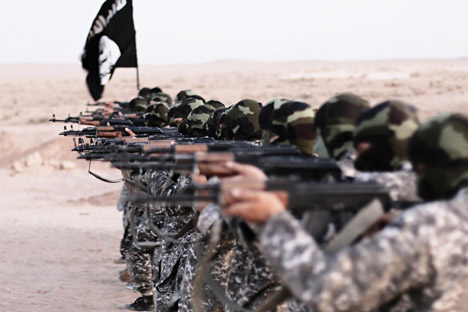
ISIS masked militants firing weapons.
Zuma\TASSWhile radical Islamist groups become increasingly effective in recruiting ordinary Russians to their cause, the state is increasing efforts to identify those at risk of falling for the ideology of such recruiters.
A court in Yekaterinburg (around 1,100 miles east of Moscow) judged that city resident Mohammad Gireyev actively used social networks to recruit potential supporters for the Jaish al-Muhajireen wal-Ansar group. This organization was earlier linked to the Islamic State jihadist group and is now affiliated with another terror group, the al-Nusra Front.
Russia actively began looking for terrorist recruiters and recruits after the widely-publicized incident involving Varvara Karaulova, a Moscow student who travelled to Turkey to enter Syria and join ISIS after being contacted by recruiters. She was detained near the Syrian border and sent back to Russia.
The mass media later started reporting, with increasing frequency, on children from well-to-do families and regions with no Islamic underground who had set off for the newly-proclaimed caliphate, after meeting recruiters on the internet. As ISIS grew it became apparent that recruiters would work not only with Muslims, but any vulnerable citizen.
Hotline set up
Yelena Sutormina, a member of the Civic Chamber of Russia, has established a hotline for those whose relatives are either planning to go to Syria or are already there. Sutormina said that she has been contacted more than 50 times since the summer.
"The people who call or write are those who suspect relatives of sympathizing with ISIS and ask to have them returned from Syria," she said.
Having received and verified information on a person who has gone to Syria, Sutormina's colleagues then write to the Interior Ministry and Russia’s Federal Security Service (FSB) asking that an international search warrant be put out for the individual. They also ask government authorities to help look for the relative if he or she has still not left Russia. A recent case involved a car dealership in a Moscow suburb, said Sutormina.
"We were told that one of the employees was becoming more and more aggressive, that he was expressing his support for the extremists, criticizing the Russian bombings. His colleagues were afraid and wrote us and we gave the information to the FSB. Now the man is being questioned," she said.
Volunteers were trying to fight recruiters unofficially, Sutormina said, with the internet expanding the geography of alarming signals.
"I have this feeling that the recruiters are ready to offer the recruits anything they lack. For some it's faith, for some love, for others violence. This is very difficult to detect," said Varvara Karaulova's lawyer Sergei Badamshin.
According to Sutormina, the Russian Security Council has received a petition from several Civic Chamber members suggesting that Roskomnadzor (The Federal Service for Supervision of Communications, Information Technology, and Mass Media) be given more authority in matters of internet resources, since it is there that ISIS carries out its recruitment.
The service can now block sites only if the General Prosecutor's Office orders it. Meanwhile, Russia’s parliament, the State Duma, is trying to toughen anti-terrorism legislation, including reviewing proposals to make punishment for recruitment harsher.
Caucasian sources
Russia’s North Caucasus is reportedly now the main supplier of ISIS recruits. The figures differ, but the FSB and the National Anti-terrorist Committee say that there are at least 4,000 Russian citizens on ISIS-controlled territory, who are mostly of North Caucasus origin.
In comparison with previous years, security forces in the North Caucasus republic of Dagestan are seeing a relative lull. Agents admit that this calm is due to the purges of underground groups before the Olympics in Sochi and then to the mass departure of radicalized youths from the republic for Syria.
"Of course, many prefer just to take their family and go to Turkey for starters. From there you can get over the border to Syria. The difference is that you can't take your family into a forest, while ISIS needs not only soldiers but also people with other professions. You can actually live there," said a Moscow-based Salafi preacher, who spoke to RIR on condition of anonymity.
The law-enforcement agencies are attentively watching the local Muslim population and are taking preventive measures with suspicious citizens.
Based on material published in the magazine Vlast.
All rights reserved by Rossiyskaya Gazeta.
Subscribe
to our newsletter!
Get the week's best stories straight to your inbox